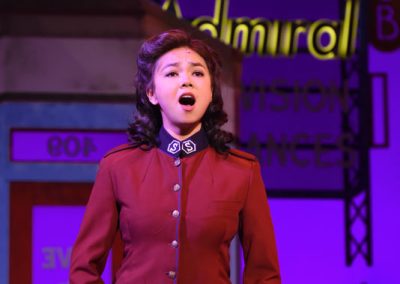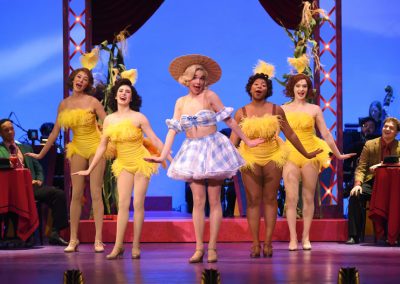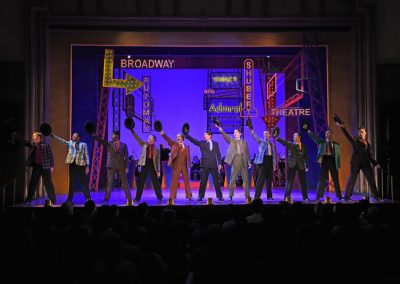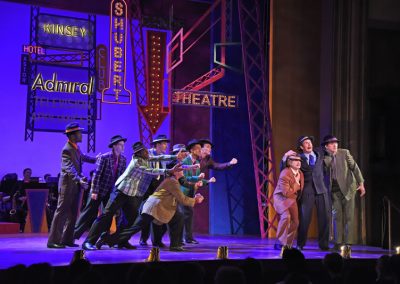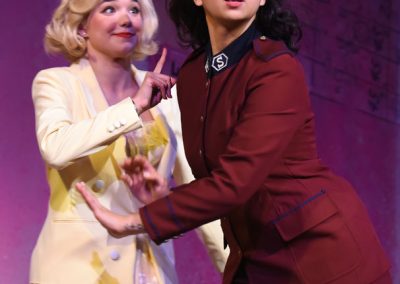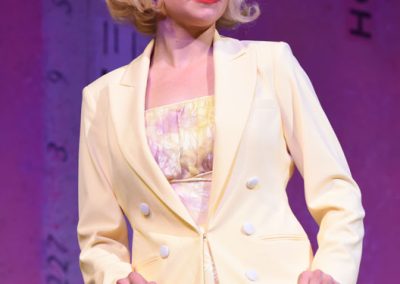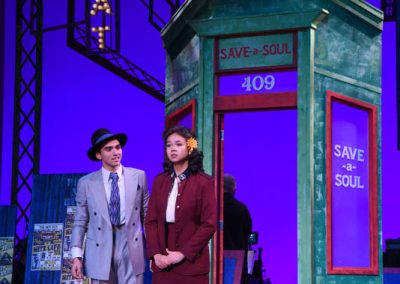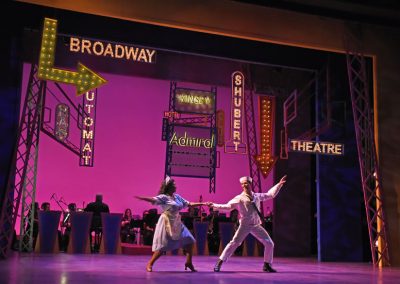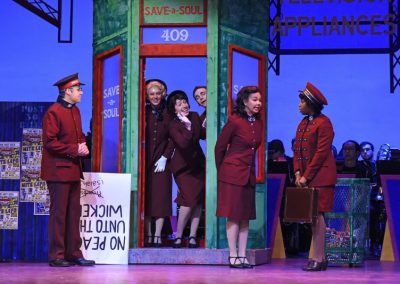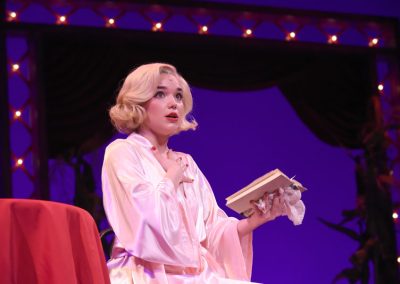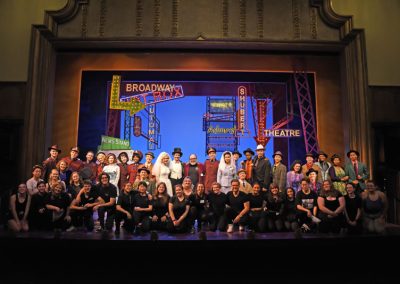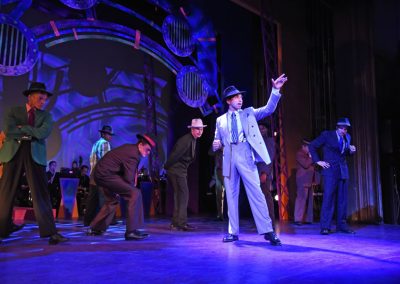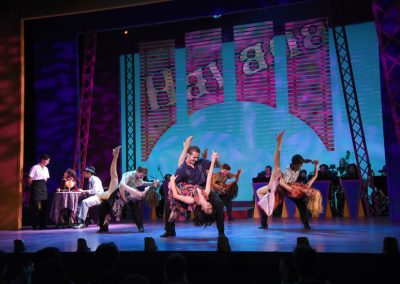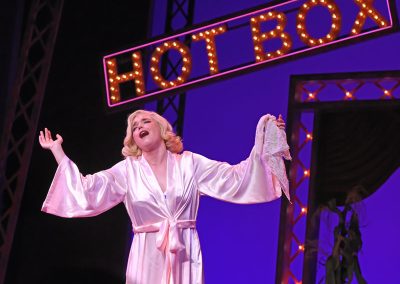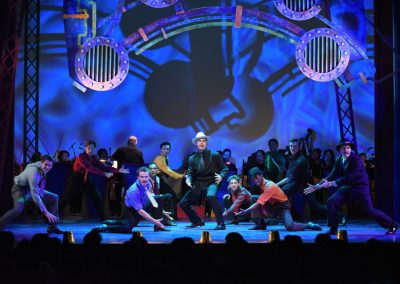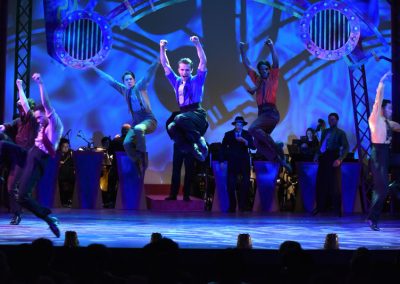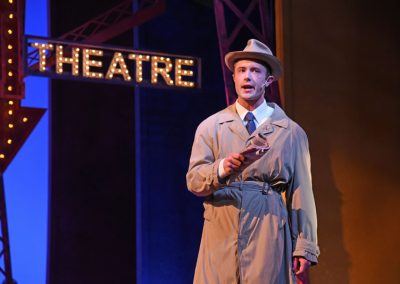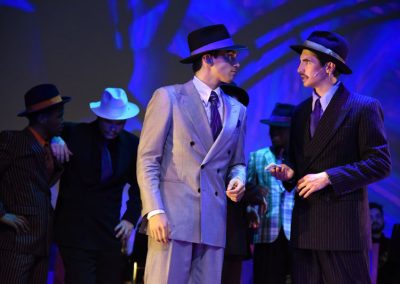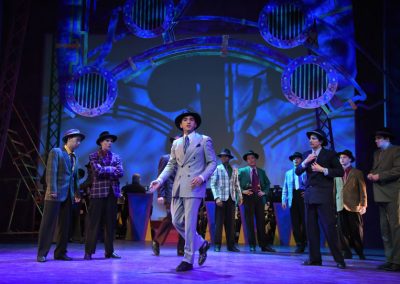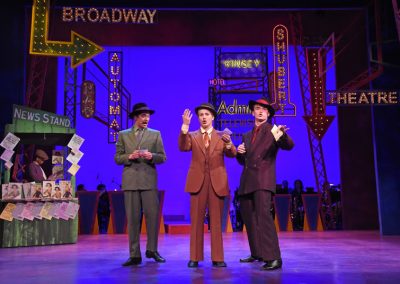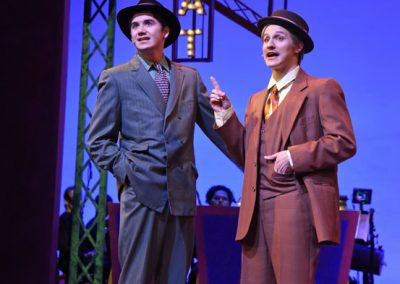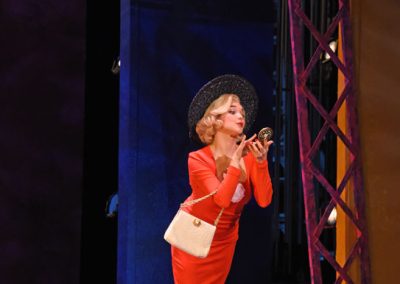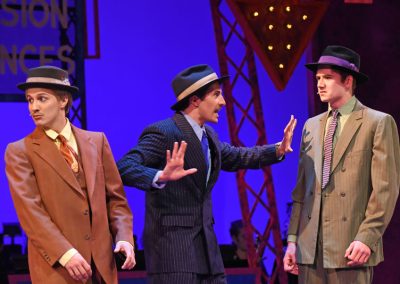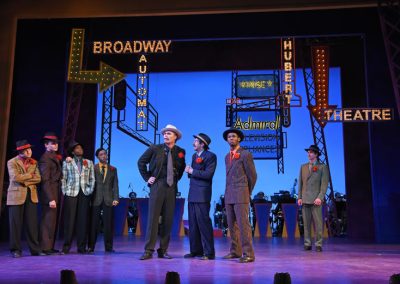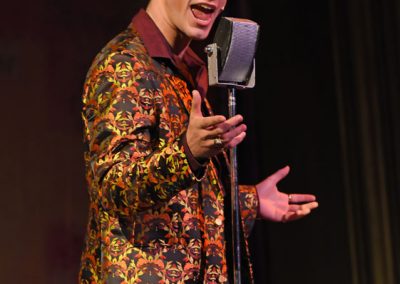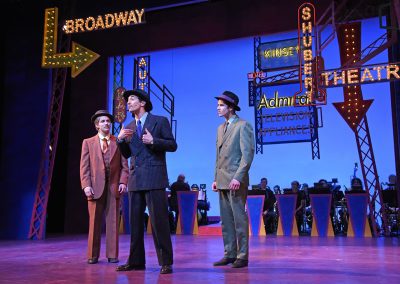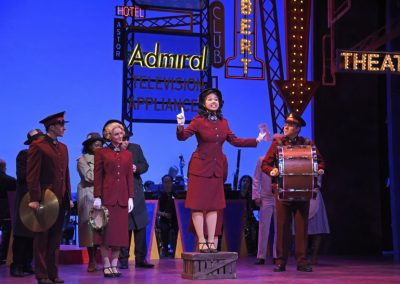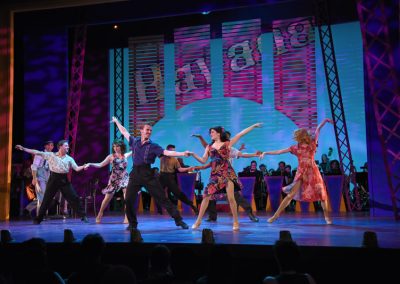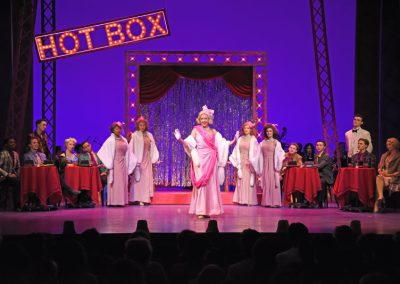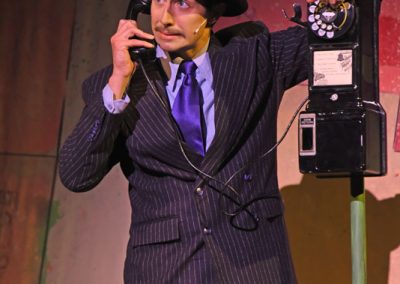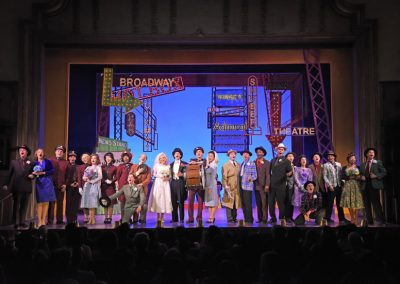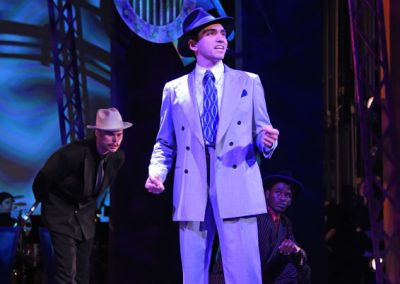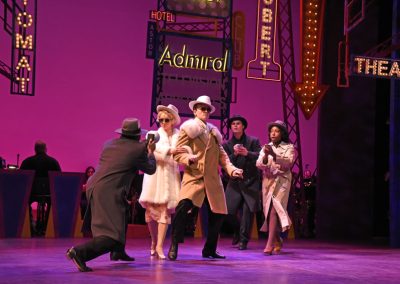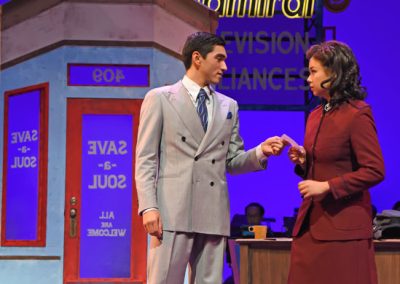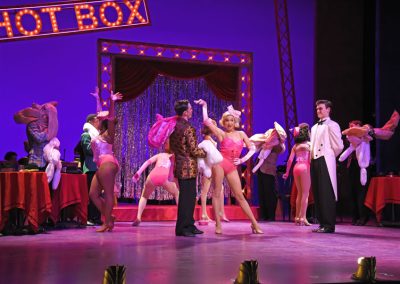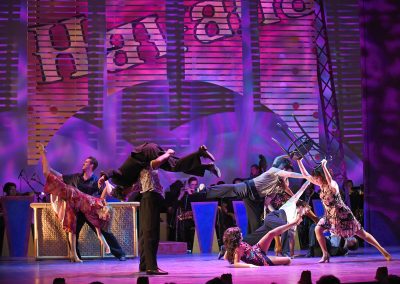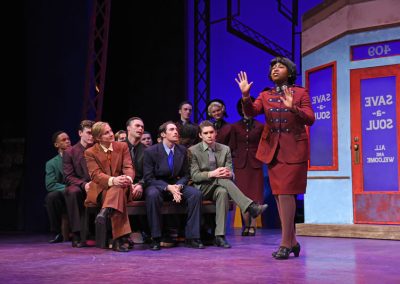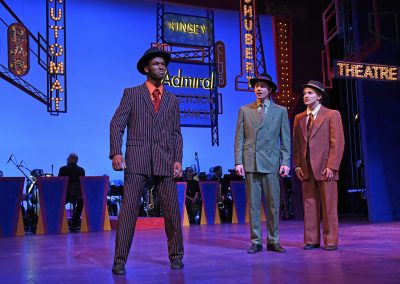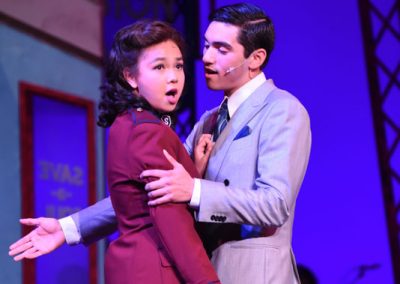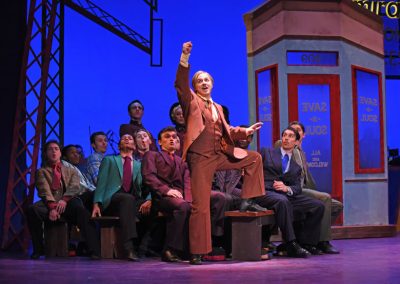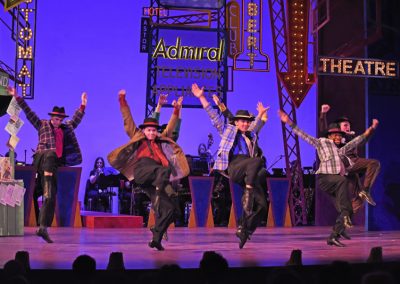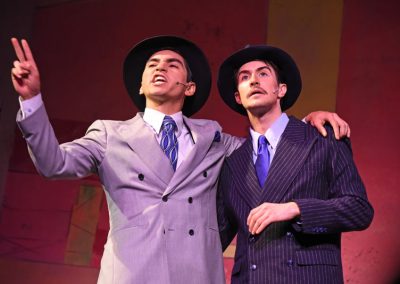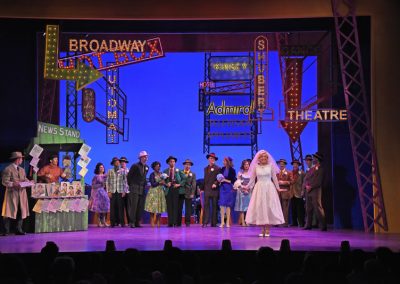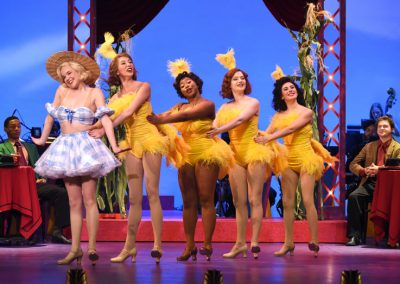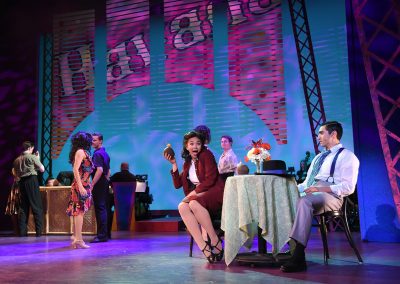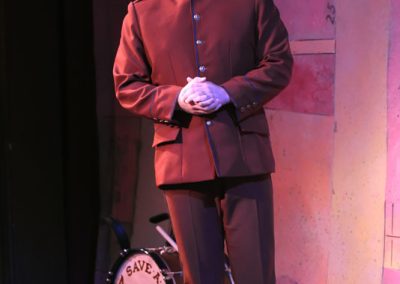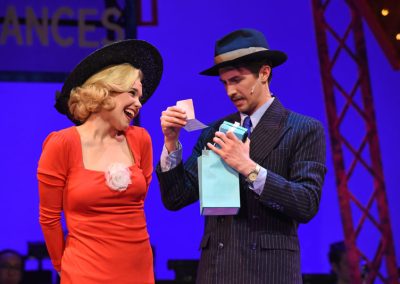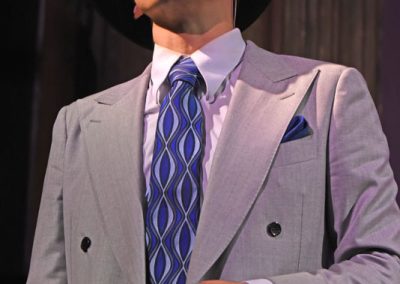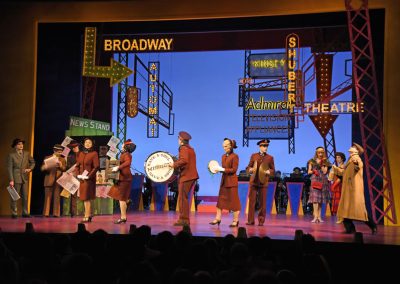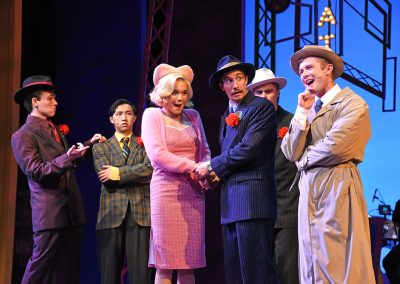Performance Programs
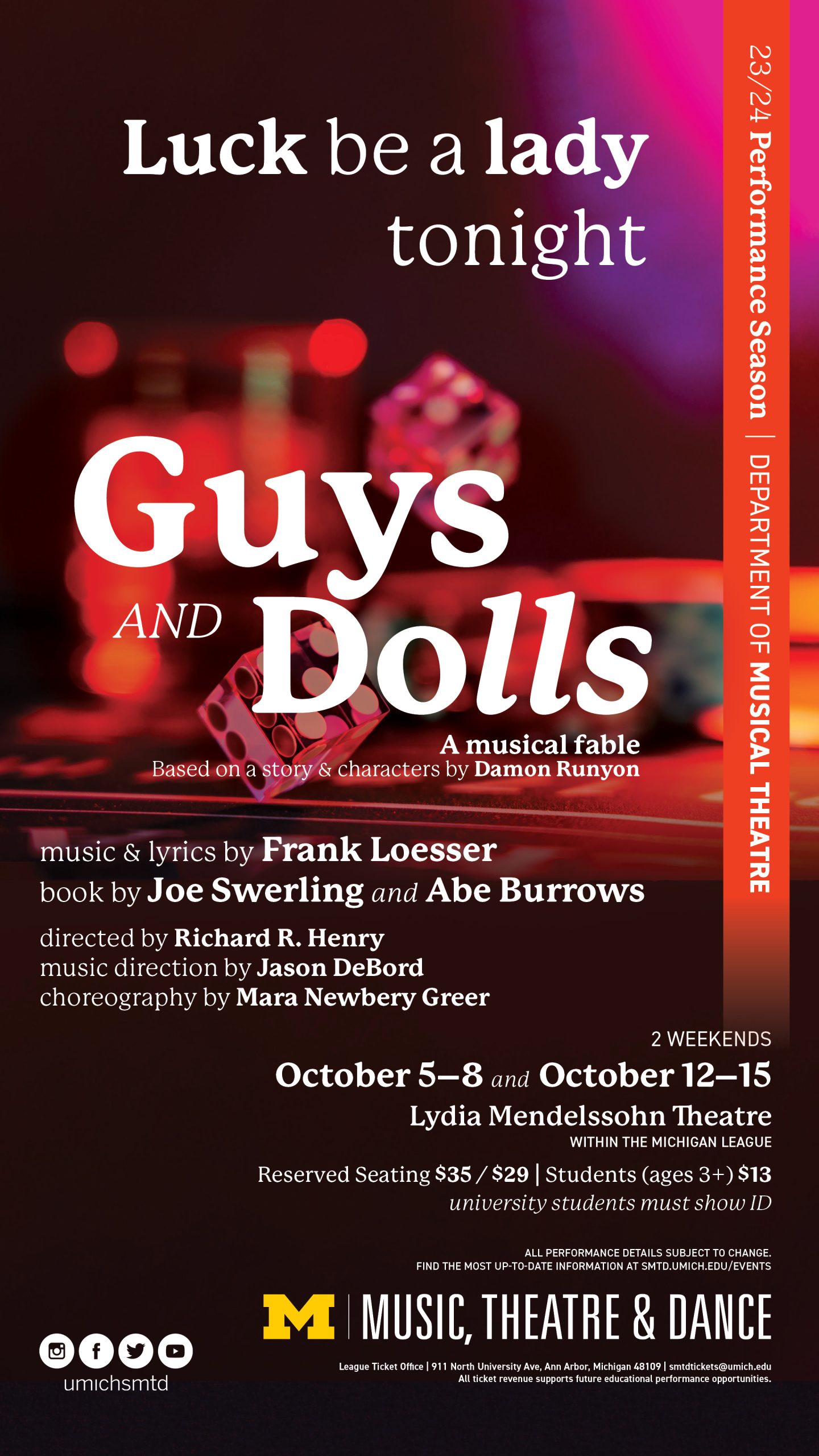
Creative Team
Director
Richard R. Henry+
Choreographer
Mara Newbery Greer+
Music Director
Jason DeBord
Scenic Designer
Tim Brown+
Costume Designer
Taylor Pfenning+
Lighting Designer
Abi Farnsworth‡
Hair and Makeup Designer
Amanda Miller+
Sound Designer
Al Hurschman+
Dramaturg
Karin Waidley
DEI Director
Nicole Johnson+
Resident Intimacy Choreographer
Raja Benz
Production Stage Manager
Briana Barker ‡
Assistants to the Creative Team
Assistant to the Music Director
Caleb Middleton‡
Assistant Choreographer/Dance Captain
Cole Newburg‡
Assistant Dramaturgs
Abigail Labbé‡, Reese Leif‡
Cast
Nathan Detroit
Chad Marge
Adelaide
Catie Leonard
Sarah Brown
Alex Humphreys
Sky Masterson
Diego Rodriguez
Arvide Abernathy
Lleyton Allen
Harry the Horse
Wesley Wray
Nicely-Nicely Johnson
Davey Burton Midkiff
General Matilda Cartwright
Kristabel Kenta-Bibi
Big Jule
Nick Aiello
Lieutenant Brannigan
Henry Crater
Benny Southstreet
Ethan Van Slyke
Joey Biltmore
Cole Newburg*
Rusty Charlie
Jason Koch
Calvin
Sam O’Neill
Martha
Audrey Graves
Agatha
Maddie Dick
Hot Box Dancers
Kate Laila Louissaint, Carly Meyer, Aquila Sol, Mariangeli Collado (Mimi)
Crapshooters
Jackson Perry, Evan Tylka, Luke Mannikus, Keyon Pickett, Haoyi Wen, Cole Newburg
Understudies
u/s Sky
Jason Koch
u/s Nathan
Sam O’Neill
u/s Adelaide
Audrey Graves
u/s Cartwright
Maddie Dick
u/s Sarah
Kate Laila Louissaint
u/s Arvide / Brannigan
Luke Mannikus
u/s Harry
Haoyi Wen
*Dance Captain
Orchestra
Conductor
Jason DeBord
Trumpets
Josie Ala *
Callum Roberts
Trombone
Michael Gerace
Benjamin Lafo
Horn
Angeline Monitello
Reeds
Harrison McComb
Connor Hoyt
Kaden Klein
Donald Schweikert
Oliver Bishop
Keyboard/Assistant Conductor
Caleb Middleton
Violins
Sita Yetasook^
Priscilla Johnson
Taylor Tookes
Javier Torres
Cello
Ewan Manalo
Bass
Anna Thielke
Percussion
Joe Mowatt
‡ SMTD Student
+ SMTD Guest Artist
* Principal
^Concertmaster
Running Crew
Light Board Operator
Banks Krause
Followspot Operators
Lindsay Robert, Maggie Meredith
Microphone Assistants
Kevin Ludwig, Fabian Rihl
Deck Crew (scenery)
Landon Wouters, Yuchen Ma
Deck Crew (props)
Maggie Meredith, Chloe Yoo, Justin Comini, Annika Juliusson
Wardrobe Crew
Ellie Van Engen^, Summer Wasung, Sammer Ali, Abigail Lyons
Wig Crew
Christine Chupailo
^Crew Head
Shop Crews
Theatrical Lighting Shira Baker, Abi Farnsworth, Sydney Geysbeek, Ethan Hoffman, Elianna Kruskal, Brandon Malin, Megan Mondek, Christian Mulville, Gabriela Ribeiro Znamensky, Kathleen Stanton-Sharpless, William Webster, Miles Zoellick
Painting Gilayah McIntosh, Bella Rowlison, Martha Sprout, Seri Stewart, Lauren Streng, Ellie Vice, Amber Walters, Angela Wu & Theatre 250/252/262 students
Props Eliza Anker, Danielle Bekas, Andy Blatt, Madysen Casey, Aquila Ewald, Dallas Fadul, Audrey Hollenbaugh, Lucy Knas, Teresa Morales, Charlotte Stallings, Audrey Tieman & Theatre 250/252 students
Scenery Marium Asghar, Juliet Bornholdt, Andy Blatt, Anna Forberg, Miles Hionis, Hannah Kryzhan, Michael Russell, Sophia Severance, Lauren Streng, Eliza Vassalo & Theatre 250/252/262 students
Costumes Maya Liu, Esmay Pricejones, Kaytlin Sanchez, Ellie Van Engen & Theatre 250/252/262 students
Production Office Briana Barker, Justin Comini, Estie Hwang
Production Crew
1st ASMs Katie Kutzko, Frannie Walton
2nd ASMs Lewis Jackson, Stuart Sheffield
Assistant Master Electrician Kathleen Stanton-Sharpless
Video Consultant Colin Fulton
Light Board Operator Eliza Anker
Design & Production Faculty Advisors
Head of Design & Production Christianne Myers
Stage Management Nancy Uffner
Scenic Design Jungah Han, Kevin Judge
Costume Design Christianne Myers, Sarah M. Oliver
Lighting Design Jess Fialko
Sound Design Henry Reynolds
Staff Mentors
Brittany Crinson, Heather Hunter, Chad Hain, Beth Sandemaier
Department of Musical Theatre
Interim Chair
Linda Goodrich
Associate Chair
Catherine A. Walker
Department Manager/Artistic Administrator
Kathryn Pamula
Walgreen Events Manager
Nickie Smith
Performance and Studio Manager
Arie Shaw
Walgreen Office Coordinator
Tyler Brunsman
Faculty
Raja Benz, Jessica Bogart, Vincent J. Cardinal, Jason DeBord, Ron De Jesús, Tyler Driskill, Caroline Helton, Lisa Mayer, Eiji Miura, Chelsea Packard, Geoffrey Packard, Sara Randazzo, Lynne Shankel, Catherine A. Walker, Ann Evans Watson, Cynthia Kortman Westphal
Professors Emeriti
Jerry DePuit, Linda Goodrich, Mark Madama, Melody Racine, Brent Wagner
University Productions Administrative Staff
Executive Director
Jeffrey Kuras
Sr Administrative Specialist
Christine Eccleston
Sr Administrative Assistant
Nathan Carrillo
Information Systems Manager
Henry Reynolds
Facilities Manager
Shannon Rice
Performance Halls
House Manager
Kelley Krahn
Lead Backstage Operations Manager
Dane Racicot
Senior Backstage Operations Manager
David Pickell
Backstage Operations Managers
Tiff Crutchfield, Alex Gay, Yvette Kashmer, Robbie Kozub
University Productions Production Staff
Production Manager
Paul Hunter
Assistant Production Manager
Michelle Williams-Elias
Technical Director (Walgreen)
Richard W. Lindsay Jr.
Theatrical Scenery Manager
Chad Hain
Lead Scenic Carpenter
Devin Miller
Scenic Carpenter
Heather Udowitz
Charge Scenic Artist
Beth Sandmaier
Associate Theatrical Paint Manager
Madison Stinemetz
Theatrical Properties Manager
Patrick A. Drone
Associate Theatrical Properties Manager
Danielle Keys
Senior Properties Artisan
Dan Erickson
Visiting Theatrical Hair and Makeup Manager
Brittany Crinson
Theatrical Lighting Manager
Heather Hunter
Associate Theatrical Lighting Manager
Jorrey Calvo
Sound Designer/Engineer
Henry Reynolds
Costume Shop Manager
Laura Brinker
Assistant Costume Shop Manager
Leslie Ann Smith
Lead Cutter/Draper
Tj Williamson
Cutter/Drapers
Seth Gilbert, Sarah Havens
Stitcher
Rene Plante
Theatrical Stitcher
Marcia Grace
Lead Costume Crafts Artisan
Elizabeth Gunderson
Costume Stock Manager
Theresa Hartman
Wardrobe Manager
Rossella Human
Theatrical Properties Stock and Tech Coordinator
Katherine Kreutz
Resources
- Musical Numbers
- About the Performance
- About the Authors
- Dramaturgical Notes
- Director's Note
- Download Program
Setting: 1950s New York City (in and around Times Square), and Havana, Cuba.
Guys and Dolls was presented through special arrangement with Musical Theatre International (MTI). All authorized performance materials were also supplied by MTI. www.MTIShows.com
The performers in this production were students in the Department of Musical Theatre. The designers for this production were students, faculty, and/or guests of SMTD. Scenery, costumes, properties, sound, and lighting were realized by the students and staff of University Productions, the producing unit of the SMTD. Thank you for supporting our educational mission.
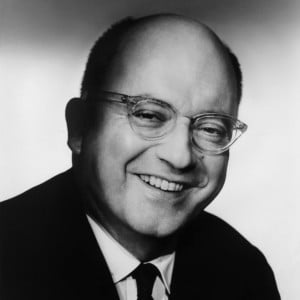 Abe Burrows (Book) Radio humorist, songwriter, singer and pianist, television personality, panelist, playwright, and stage director Abe Burrows (b. New York, NY, 18 December 1910; d. New York, NY, 17 May 1985) is perhaps best remembered as one of the creators, with Frank Loesser, of two of the greatest Broadway shows in history, Guys and Dolls (1950) and How to Succeed in Business without Really Trying (1961). In the decade between these monumental bookends, Burrows was ever-present on Broadway, directing Two on the Aisle (1951), Three Wishes for Jamie (1952), Can-Can (1953), and Happy Hunting (1956), and collaborating on the scripts of Make a Wish (1951), Silk Stockings (1955), and Say, Darling (1958). He won four Tony Awards®, three for authorship and one for directing, and How to Succeed was also awarded a Pulitzer Prize.
Abe Burrows (Book) Radio humorist, songwriter, singer and pianist, television personality, panelist, playwright, and stage director Abe Burrows (b. New York, NY, 18 December 1910; d. New York, NY, 17 May 1985) is perhaps best remembered as one of the creators, with Frank Loesser, of two of the greatest Broadway shows in history, Guys and Dolls (1950) and How to Succeed in Business without Really Trying (1961). In the decade between these monumental bookends, Burrows was ever-present on Broadway, directing Two on the Aisle (1951), Three Wishes for Jamie (1952), Can-Can (1953), and Happy Hunting (1956), and collaborating on the scripts of Make a Wish (1951), Silk Stockings (1955), and Say, Darling (1958). He won four Tony Awards®, three for authorship and one for directing, and How to Succeed was also awarded a Pulitzer Prize.
—Excerpted from MasterWorksBroadway.com
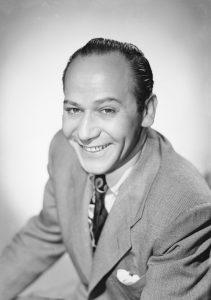
(Photo by Gene Lester/Getty Images)
Frank Loesser (Music and Lyrics) has been called the most versatile of all Broadway composers. Each of his five Broadway musicals—Where’s Charley?, Guys and Dolls, The Most Happy Fella, Greenwillow, and How to Succeed in Business without Really Trying—is endowed with its own unique sound and style.
Long before Broadway success, Loesser was known for the dozens of song hits from his days in Hollywood. He had supplied lyrics to the music of such greats as Jule Styne, Burton Lane, Hoagy Carmichael, and Arthur Schwartz, penning such songs as “I Don’t Want to Walk without You,” “Two Sleepy People,” “Heart and Soul,” “They’re Either Too Young or Too Old,” and finally, as composer/lyricist, “Spring Will Be a Little Late This Year,” “On a Slow Boat to China,” and his 1948 Academy Award winner, “Baby, It’s Cold Outside.”
Born June 29, 1910, in New York City, Loesser never studied music formally. His father was a distinguished teacher of classical piano and his older brother, Arthur, a renowned concert pianist, musicologist, and music critic, but Frank refused to study the classics, favoring popular music, which his father disdained. Frank taught himself the harmonica and the piano in his early teens. He dropped out of college during the Depression, supporting himself with an array of jobs that included selling newspaper advertising and working as a process server and city editor of a short-lived newspaper in New Rochelle.
—Bio excerpted from FrankLoesser.com
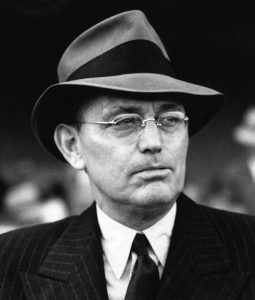 Damon Runyon (Story and Characters), in full Alfred Damon Runyon, was an American journalist and short-story writer best known for his book Guys and Dolls, written in the regional slang that became his trademark. In 1911 he moved to New York City, where he became a reporter for the New York American. He covered the New York baseball clubs for many years as well as various other sports topics, and along the way he developed his style of focusing on human interest rather than strictly reporting facts. He began writing stories about a racy section of Broadway, and these were collected in Guys and Dolls (1931). This book is representative of Runyon’s style in its use of an exaggerated version of local idiom to portray a particular class of characters—gamblers, promoters, fight managers, race-track bookies, and other habitués of the street. Employing an unusual and colourful style, he produced such characters as Joe the Joker, Apple Annie, and Regret the Horseplayer, who became familiar to thousands of his readers.
Damon Runyon (Story and Characters), in full Alfred Damon Runyon, was an American journalist and short-story writer best known for his book Guys and Dolls, written in the regional slang that became his trademark. In 1911 he moved to New York City, where he became a reporter for the New York American. He covered the New York baseball clubs for many years as well as various other sports topics, and along the way he developed his style of focusing on human interest rather than strictly reporting facts. He began writing stories about a racy section of Broadway, and these were collected in Guys and Dolls (1931). This book is representative of Runyon’s style in its use of an exaggerated version of local idiom to portray a particular class of characters—gamblers, promoters, fight managers, race-track bookies, and other habitués of the street. Employing an unusual and colourful style, he produced such characters as Joe the Joker, Apple Annie, and Regret the Horseplayer, who became familiar to thousands of his readers.
—Excerpted from Brittanica.com
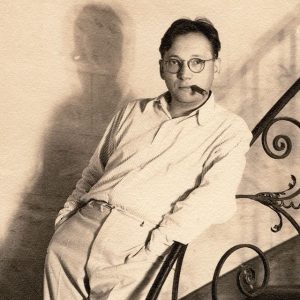 Jo Swerling (Book) Born in Berdichev, Ukraine, in what was Czarist Russia, Swerling emigrated with his family to New York City’s Lower East Side. He worked as a journalist in the 1920s and began to write plays. After writing a stage show and a screenplay for the Marx Brothers, Swerling scored a major success with the book and lyrics for the musical revue The New Yorkers and the play The Kibitzer, which he co-wrote with actor Edward G. Robinson.
Jo Swerling (Book) Born in Berdichev, Ukraine, in what was Czarist Russia, Swerling emigrated with his family to New York City’s Lower East Side. He worked as a journalist in the 1920s and began to write plays. After writing a stage show and a screenplay for the Marx Brothers, Swerling scored a major success with the book and lyrics for the musical revue The New Yorkers and the play The Kibitzer, which he co-wrote with actor Edward G. Robinson.
After the Wall Street crash in 1929, Swerling left for Hollywood. He wrote dozens of screenplays in the 1930s and 1940s, including some scenes for It’s a Wonderful Life and some uncredited work on Gone with the Wind. He received his sole Oscar nomination for The Pride of the Yankees. Swerling’s greatest professional success came when he returned to Broadway, co-writing the book for Guys and Dolls with Abe Burrows, for which he shared the Tony and the New York Drama Critics’ Circle Awards for Best Musical. The show was a smash, running from November 1950 to November 1953 for 1,200 performances.
—Excerpted from the Oregon Shakespeare Festival
“It’s important to not shy away from our past, but there has to be an interrogation, for all of us, about what kind of art we’re making now, and why,” said Leigh Silverman, Broadway musical director, in the article “Stereotypes? But They’re Classics.”
Guys and Dolls was inspired by the characters of Damon Runyon, an early 20th-century journalist and short-story writer whose prolific prowess sometimes gets overshadowed by the popularity of this Golden Age musical. A Spanish-American war veteran who covered the major events of his time, from WWI to the Lindbergh kidnapping case to every World Series, Runyon’s love of the lore of his homeland and obsession with the undersides of the human experience, led him to pen larger-than-life characters who speak in “Runyonese,” a language unique to them. In the opening minutes of the show, we are introduced to the vibrance of Runyonland. It is a mythic place of imagination that Runyon’s journeys across the country by train first gave birth to, filled with his beloved gangsters and hustlers, tourists and travelers, upper class and working class, those making an honest living or stretching the truth to survive. What this vast array of characters all have in common is the lifeblood of a New York City after Prohibition (for Runyon) and an America after WWII (for Frank Loesser) that pulses through their veins, setting the stage for the blending of Runyon’s stories and characters with the music and dance of Guys and Dolls.
This musical’s relevance to American culture is undeniable—since its 1950 Broadway premiere and 1955 film adaptation, Guys and Dolls has been written into the canon of musical theatre as an unprecedented success. Followed by eight revivals on Broadway and the West End, the pulsing story of this piece holds a special place in the hearts of musical lovers across the globe. The film reached a broader audience with Runyon’s vivid writings and the appeal of the lyrical interpretations of Frank Loesser, Abe Burrows, and Jo Swerling. This widespread theatrical release etched both recognizable songs and lovable characters (despite their flaws)—portrayed by iconic performers such as Jean Simmons, Vivian Blaine, Frank Sinatra, and Marlon Brando—into the permanence of American culture.
In a booming era of topical and evocative art, the industry today is reckoning with how these classics fit into the current landscape of US theatre, especially one whose origins are so rich yet certainly reflect the ideologies of its time. In recent years, reimaginings of great American classics—such as the 2019 Broadway revival of Oklahoma—have skyrocketed in popularity, allowing today’s artists to explore older material within the context of this current cultural moment. We are constantly searching for ways to live both then and now by honoring the legacy of the past without sacrificing the integrity of the present and future. Our production kept the magic of Damon Runyon’s characters alive while taking the time to acknowledge the sensitive topics and limiting language present in the story. With meaningful conversations led by DEI and intimacy consultants, we hoped to create a culture of care necessary for revisiting classics. In the rehearsal room, the dramaturgy team displayed a collage of images not only exploring the world of the show but also showcasing a diversity of people who are often overlooked by the glamorizing of Runyon’s grit that drives the musical. The creative team encouraged each performer to bring their own identities into this classic in a way that felt authentic to them.
For some, Guys and Dolls may not feel relevant and fresh. Our research provided context and methods to reframe moments of outdated gender roles and breathe new vigor into them. In “Marry the Man Today,” the “dolls” take control of their futures independently and in spite of their “guys.” In “Guys and Dolls,” a lovable duo explores broad definitions of romance, gender expression, and sexuality. Even our conversations with the Hot Box dancers helped to reframe crowd-pleasing numbers to decenter the objectification of women when approaching the material. We may not be able to point to a specific moment and say, there it is—the fruits of our dramaturgy—but if you cut this production open, like the ink and lifeblood of Runyon’s characters, it pours through its veins, bringing new possibilities, perspectives, and perhaps another kind of permanence to this classic.
For more information from the dramaturgy team, scan here:

Guys and Dolls, a musical fable of Broadway, premiered in 1950. This 73-year-old American musical theatre masterpiece still fills the heart with joyous songs and indelible characters from a bygone era. What a privilege it has been to introduce this timeless classic to a new generation of extraordinarily talented Michigan musical theatre students. It truly takes a village to stage a musical. I am grateful to the cast, crew, orchestra, and production team et al for including me so generously in this work. How lucky we are to have the opportunity to join together as a community to celebrate through song and dance.
Richard R. Henry, Director

